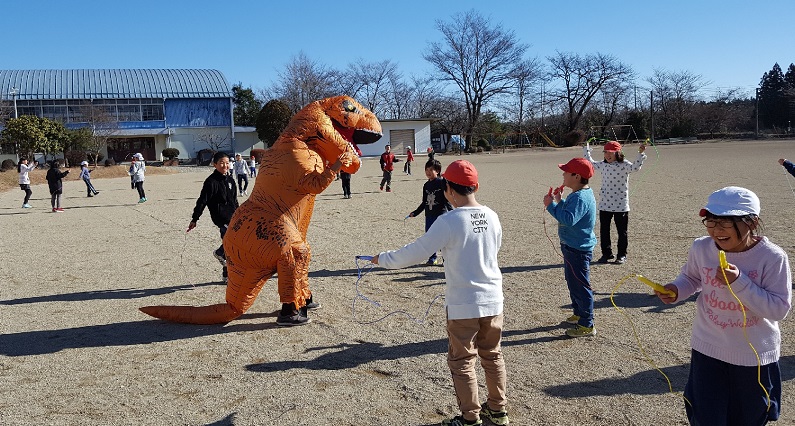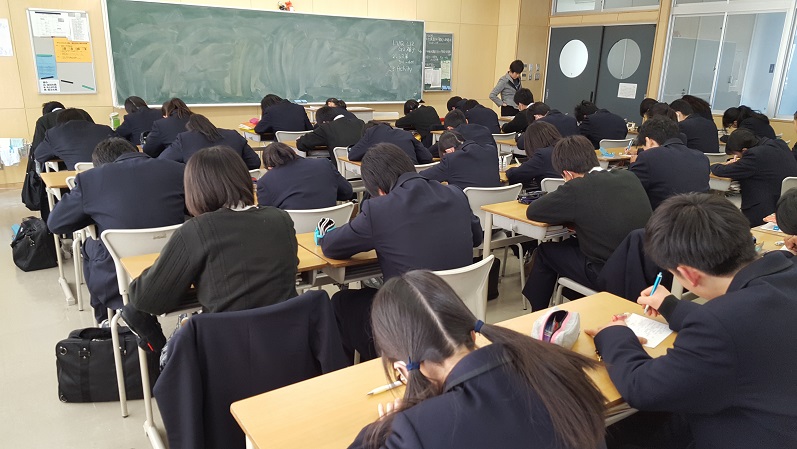
My four-year teaching career has now come to an end. I liked it, I was good at it, and I can always fall back on it if need be. I’ve now experienced almost everything I’ve wanted to experience about school life in Japan. Continuing any further would be less about new experiences and more about long-term career and life goals—a noble path but not mine just yet.
English teaching jobs are actually very easy to get, though potential employers would have you think they’re granting you a rare privilege. The only requirements are having a four-year college degree (mainly for immigration purposes) and having your primary and secondary education all done in English. On top of this, if you understand basic grammar and have a clear voice, you’re well-qualified for the job. Teacher training, teaching experience, and Japanese ability may be viewed favorably but definitely aren’t necessary. Contracts typically run for one year and will be renewed unless you’re downright terrible or disliked at your job.
The JET programme is widely considered the best teaching gig in Japan. You’re hired directly by the Japanese government, so there’s no middleman finding ways to nickel & dime you. The timing for JET didn’t work out for me, so I applied to two companies instead: AEON and Interac.
First I interviewed with AEON, a private English conversation school. To make a long story short, they’re a bunch of assholes. Post forthcoming.
Then I interviewed with Interac, a middleman company that places teachers directly in the Japanese school system, generally in elementary and junior high schools. Nothing fancy, no curveballs, just a matter-of-fact interview, and I got the job. A few months later they offered me a placement in a countryside town. While you have the right to reject a placement, that generally puts you at the end of the waiting list until another chance comes up. I thought timing was more important than location, so I accepted the offer and left for Japan soon thereafter.
Teaching in elementary and junior high schools is mostly based around games and activities. Elementary school students don’t do any formal studying of English. Junior high school students have a Japanese teacher of English to teach them grammar, writing, vocabulary, and all the other nitty-gritty of the language. Most of these Japanese teachers of English aren’t fluent, which is why native-speaking foreigners are needed.
Some schools provide lessons plans. Some individual teachers provide lesson plans. Other times you’ll have to develop lessons yourself. It’s not hard though; your middleman company will give you just about all the training you’ll need. Then with a bit of experience it becomes second nature.
After two years of not getting laid in the countryside, I wanted to move to the city. The two year mark is when the average foreign teacher moves back home, giving the remaining teachers more leverage with their veteran status. I moved on to a middleman company that placed teachers in private junior high and high schools. The gig came with a modest jump in pay and benefits. Whereas I basically lost money during my first two years in Japan, I came out ahead during my next two years.

Elementary school is fun. The students are excited to study a new language. There are no tests, no homework, and the classes are all fun and games.
Junior high school get more serious. Students have to buckle down and study hard, but the most important English is learned here, and game-based activities are still effective.
High school English classes suck, unless you’re teaching honors students. The lesson topics are often too difficult and specific to use general games, so you’re stuck teaching straight out of the textbook. Even if you could apply games, many high school students have already given up on learning English and don’t want to participate in class. You just have to plow through and hope you’ll get through to at least some students.
Much of the fun of teaching high school comes outside of class. Holding English conversations with random students in the hallways or at lunch time can be extremely fun. You also get to experience all most of the school life shit you see in anime.
I probably could’ve given my last job another year or two. However, the only career path from there would’ve been to move up into management, which doesn’t interest me in the least.
Starting in April, I’ll give patent law another chance, this time at a Japanese law firm. I’ll be doing basically what I did in America several years back, except it’ll be half in Japanese and for a third of the pay. I guess it would’ve paid tremendously not to fuck up the first time, but hey, at least this way I got to experience the anime life.
Hey Baka, after so many years living in Japan did you managed to learn fluent Japanese or like so many other expats living abroad, not needing to speak anything other than English end up not learning the country’s language?
I am sad because I was expecting this site to become material for a new anime called Great Teacher Baka-Raptor. It even comes with original filler posts for filler arcs.
I’m better at Japanese than most expats (except the ones from China and Korea), but actually becoming fluent would probably take another 4 years. Post on learning Japanese forthcoming.
I’ve collected enough stories over the past 4 years to make a ++ 13 episode anime. I just need someone to draw it.
Did you ever gear a lesson around RPGs? Just curious. I taught nutrition in after school programs for a few years, and it is definitely tough the higher up you go in age, but it can let you make more complex games and concept activities. If that’s your thing. Going for law again, eh? Gonna be Baka Barristers? Or maybe you’ll be a salary man that gets transported to another world? That’s pretty popular these days.
I’ve done some anime translating and dubbing lessons, but you need small class sizes for that to be remotely manageable. I think if I did an RPG lesson the students would find some way to cheat. I know I would.
Maybe I’ll try to break into managing idols.
Wow, Japanese law firm. Best of luck there.
Thanks, I’m going to need it.
Does teaching Engrish in Japan pay well
As a full-time job, no. As a part-time job, yes.
Posted April 1st – can’t tell if this is the most deadpan April Fool’s delivery on record, or if it’s serious >.<
Thank you for framing that as a comment rather than a question. I shall keep the audience guessing.